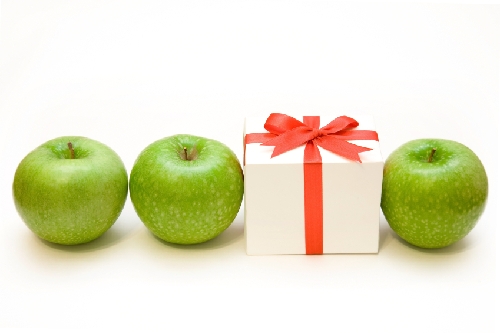 A recent study out of the University of Arizona and the University of Southern California evaluated the effects of using material rewards, such as toys and money, to motivate individuals to choose smaller portion sizes.
A recent study out of the University of Arizona and the University of Southern California evaluated the effects of using material rewards, such as toys and money, to motivate individuals to choose smaller portion sizes.
Companies have been marketing foods to kids for years. You probably remember your ‘Happy Meal’ always including the latest trendy toy. Marketing researchers have demonstrated that children are more motivated by the toy, rather than the food itself. Unfortunately, this had led to many kids choosing fast food joints, which are filled with high fat, high-calorie and low nutrient filled foods. This has been one of the major contributors to weight gain and the obesity epidemic.
Researchers demonstrated the effects of rewards and food portion choices in both children and adult groups though four experimental studies. The pilot study included seventy elementary school children. Children could choose half portions of popular entrees such as a sub sandwich, a mini pizza, a small hamburger, a small bag of fries or chicken nuggets plus a cookie and a toy or they could choose a larger food portion with no toy. Findings revealed that the children preferred the half portions with the toy compared to larger portions—except when they could choose nuggets and cookies.
The rest of the experiments included adult groups. Participants could choose smaller portions with the possibility of winning money or choose a larger portion. Findings revealed that it wasn’t just the reward itself but the chance of winning a reward that was reason enough for them to choose smaller portion sizes. Further, when the monetary value of the potential prize was higher, participants were more likely to choose the smaller portion sizes and take the chance to win compared with choosing a larger portion sized meal.
“The fact that participants were willing to substitute part of a tangible food item for the mere prospect of a relatively small monetary premium is intriguing,” stated study author, Martin Reimann. Another author, Deborah MacInnis commented “Unlike the Happy Meal, which offers a toy every time, adults were willing to sacrifice calories for a gamble.”
Further to this study, researchers evaluated brain activity using fMRI scans. They discovered that certain areas of the brain were more stimulated when participants chose smaller portions in combination with a reward or prospect of a reward compared to choosing larger portions. These areas of the brain that were stimulated were areas that are typically associated with reward, desire and motivation.
People were more motivated to make these decisions regardless of their hunger state. They even felt satiated after consuming a half portion, even if they were hungry. More so, they didn’t consume excessive calories later on.
This demonstrates that good behaviors, whether it is a parent rewarding their children or an adult celebrating a job promotion, can be rewarded using non-food items. It’s especially important to prevent children from linking good behavior to high calorie, unhealthy food items, potentially leading to weight gain and obesity.
Study author, Antoine Bechara stated, “Restaurants and food manufacturers are, more often than not, interested in selling more food, not less. Our research provides a simple but powerful solution to unite these two, seemingly contradictory goals of selling more versus eating less.”
Sources for Today’s Article:
“Eat less and be happy- really,” EurekAlert web site; http://www.eurekalert.org/pub_releases/2016-01/cfb-ela010616.php, last accessed January 12, 2016.
Reimann, M., et al., “Can Smaller Meals Make You Happy? Behavioral, Neurophysiological, and Psychological Insights into Motivating Smaller Portion Choice,” The Behavioral Science of Eating 2016; 1(1).
